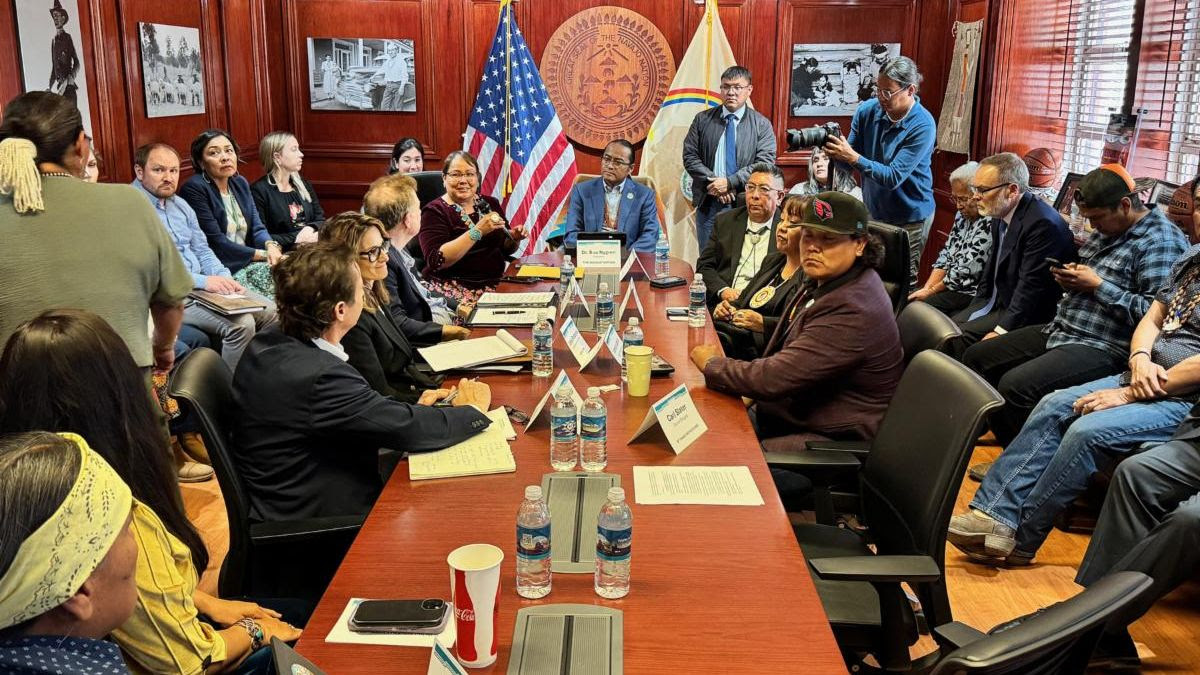
- Details
- By Native News Online Staff
On Thursday, Speaker Crystalyne Curley of the 25th Navajo Nation Council, accompanied by several Council Delegates and Navajo Nation President Buu Nygren, hosted senior officials from the U.S. Department of the Interior (DOI) and the Bureau of Reclamation (BOR) to advance the tribes’ historic water rights settlement in Arizona.
Hopi Tribal Chairman Timothy Nuvangyaoma and San Juan Southern Paiute President Carlene Yellowhair also participated in welcoming DOI Senior Advisor and Acting Assistant Secretary for Water and Science Scott Cameron, DOI Principal Deputy Assistant Secretary Janel Broderick, BOR Acting Commissioner David Palumbo, and DOI Acting Director of the Secretary’s Indian Water Rights Office Sarah LeFlore.
Tribal leaders urged federal officials to support the Northeastern Arizona Indian Water Rights Settlement Agreement, which is designed to resolve longstanding legal disputes and secure reliable, long-term water access for the Navajo Nation, the Hopi Tribe, and the San Juan Southern Paiute Tribe.
“For generations, our Navajo people in many communities have waited for access to clean, reliable water,” said Speaker Curley. “Meeting with the Department of the Interior and the Bureau of Reclamation is an important step in ensuring that the resources, technical expertise, and federal commitments are in place to make this settlement a reality.”
Discussions also addressed the importance of reaching agreement among various Upper and Lower Basin states along the Colorado River to move forward with key components of the proposed settlement.
Under the agreement, the Navajo Nation would be allocated 44,700 acre-feet per year (AFY) from Arizona’s Upper Basin share of the Colorado River, in addition to 3,600 AFY of fourth-priority water from the Lower Basin, all flows from the Little Colorado River that reach the Nation, and legally recognized rights to water from the Navajo and Coconino aquifers.
Council members underscored the urgency of implementation, emphasizing the Interior Department and Bureau of Reclamation’s pivotal role in securing backing from the Trump Administration and Congress for the settlement.
Council Delegates Brenda Jesus, Otto Tso, Casey Allen Johnson, Vince James, Carl Slater, Germaine Simonson, Helena Nez Begay, and Cherilyn Yazzie were also present to advocate for continued federal support.
“We want you to take our messages back to Washington D.C. Many of our elders have never experienced turning on a water faucet in their home. Let’s continue to fight for our Indigenous families,” said Delegate James.
The Navajo Nation remains committed to pursuing congressional approval of the settlement legislation, while coordinating closely with federal partners to ensure timely implementation of water infrastructure projects once the agreement is enacted.
More Stories Like This
NCAI Passes Two Emergency Resolutions on Immigration Enforcement ActivitiesChickasaw Lighthorse Police Officer named Indian Country Law Enforcement Officer of the Year
Indian Gaming Association Rallies Broad Coalition Against Sports Event Contracts It Calls Illegal Threat to Tribal Sovereignty
Navajo Resources and Development Committee Issues Notice on Livestock Inspection Requirements
American Prairie, Tribal Coalition Files Protest Over Rescinded Grazing Rights
Help us defend tribal sovereignty.
At Native News Online, our mission is rooted in telling the stories that strengthen sovereignty and uplift Indigenous voices — not just at year’s end, but every single day.
Because of your generosity last year, we were able to keep our reporters on the ground in tribal communities, at national gatherings and in the halls of Congress — covering the issues that matter most to Indian Country: sovereignty, culture, education, health and economic opportunity.
That support sustained us through a tough year in 2025. Now, as we look to the year ahead, we need your help right now to ensure warrior journalism remains strong — reporting that defends tribal sovereignty, amplifies Native truth, and holds power accountable.
 The stakes couldn't be higher. Your support keeps Native voices heard, Native stories told and Native sovereignty defended.
The stakes couldn't be higher. Your support keeps Native voices heard, Native stories told and Native sovereignty defended.
Stand with Warrior Journalism today.
Levi Rickert (Potawatomi), Editor & Publisher


